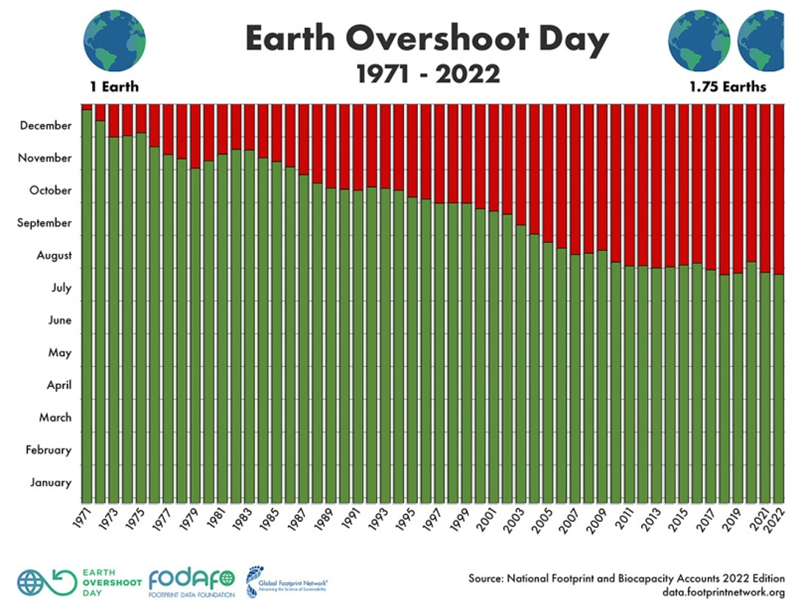
Section 12. Thematic reviews
12.3. Earth Overshoot Day 2022
Earth Overshoot Day 2022 falls on 28 July. This day marks the date when we have used all the biological resources that the Earth can renew during the entire year. In 1970, the population consumed just as much resources as our planet could renew during the year. In 2021, humanity needed 1.7 such planets for comfortable life.

The Earth Overshoot Day can be calculated for each country. A Country Overshoot Day reflects the ecological footprint of a country by comparing the population’s demand and the nation’s biocapacity.

On a planetary scale, reducing the ecological footprint is linked to preserving and restoring ecosystems. If we restore 350 ha of forest that has disappeared in recent years, this would move the date 8 days.
The global campaign for sustainable development will be decided in cities. 80% of all people is expected to live in urban areas by 2050. Smart city planning and urban development strategies are instrumental to making sure there is enough biological regeneration to avoid excessive human demand that would erode it. 17% of the total carbon footprint left by humans comes from car emissions. Cutting emissions by as little as 50% would move the date 13 days back.
The carbon emissions make up 57% of humanity’s ecological footprint. Over 150 years ago, the carbon footprint of humanity was close to zero. If we want to limit the global temperature increase to below 2°C, the carbon footprint would have to be zero again before 2050. Existing off-the-shelf, commercial energy-efficiency technologies for buildings, industrial processes, and electricity production could move Overshoot Day at least 21 days, without any loss in productivity or comfort. Reducing the carbon component of humanity’s Ecological Footprint by 50% would move Earth Overshoot Day by 93 days, or more than three months.
Half of Earth‘s biocapacity is used to feed humanity. About one third of the food produced in the world for human consumption gets lost or wasted. 40% of all food gets wasted in the US. This is comparable to the ecological footprint of Sweden and Colombia cumulatively. If we cut food waste in half worldwide, we would move Overshoot Day 13 days.
Food production is a very energy-intensive process, especially as concerns the animal husbandry. China has started a program aimed to reduce meat consumption by 50%. If successful, this will move the date 5 days back. If we reduce global meat consumption by 50%, we would move Overshoot Day 17 days.